Report on the Role of Equity in Human Motivation and Behaviour
VerifiedAdded on 2022/10/01
|9
|2704
|18
Report
AI Summary
This report provides a mini literature review on the role of equity in human motivation and workplace behavior. It analyzes four articles that explore the impact of fair treatment on employee motivation, job satisfaction, and organizational effectiveness. The articles discuss the importance of pay equity, distributive justice, and the consequences of inequity, such as reduced motivation and negative workplace behavior. The report examines the implications of equity theory in different contexts, including workforce nationalization and its effect on employee performance. The findings emphasize that equitable practices lead to increased employee commitment, productivity, and reduced turnover. The conclusion highlights the critical role of equity in creating a positive and productive work environment, where employees feel valued and motivated to contribute to the firm's goals. This report is a valuable resource for understanding the impact of equity on human behavior in organizations.
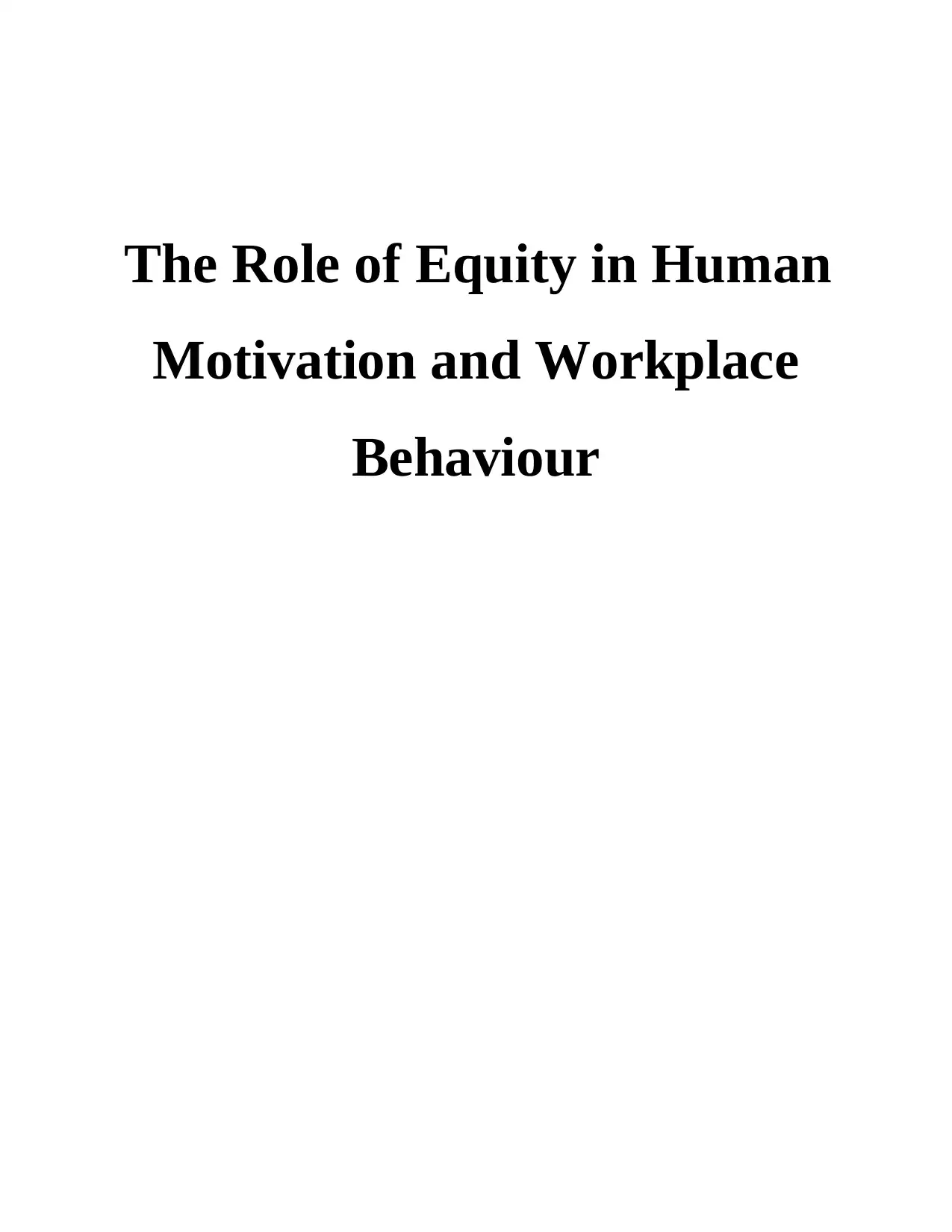
The Role of Equity in Human
Motivation and Workplace
Behaviour
Motivation and Workplace
Behaviour
Paraphrase This Document
Need a fresh take? Get an instant paraphrase of this document with our AI Paraphraser
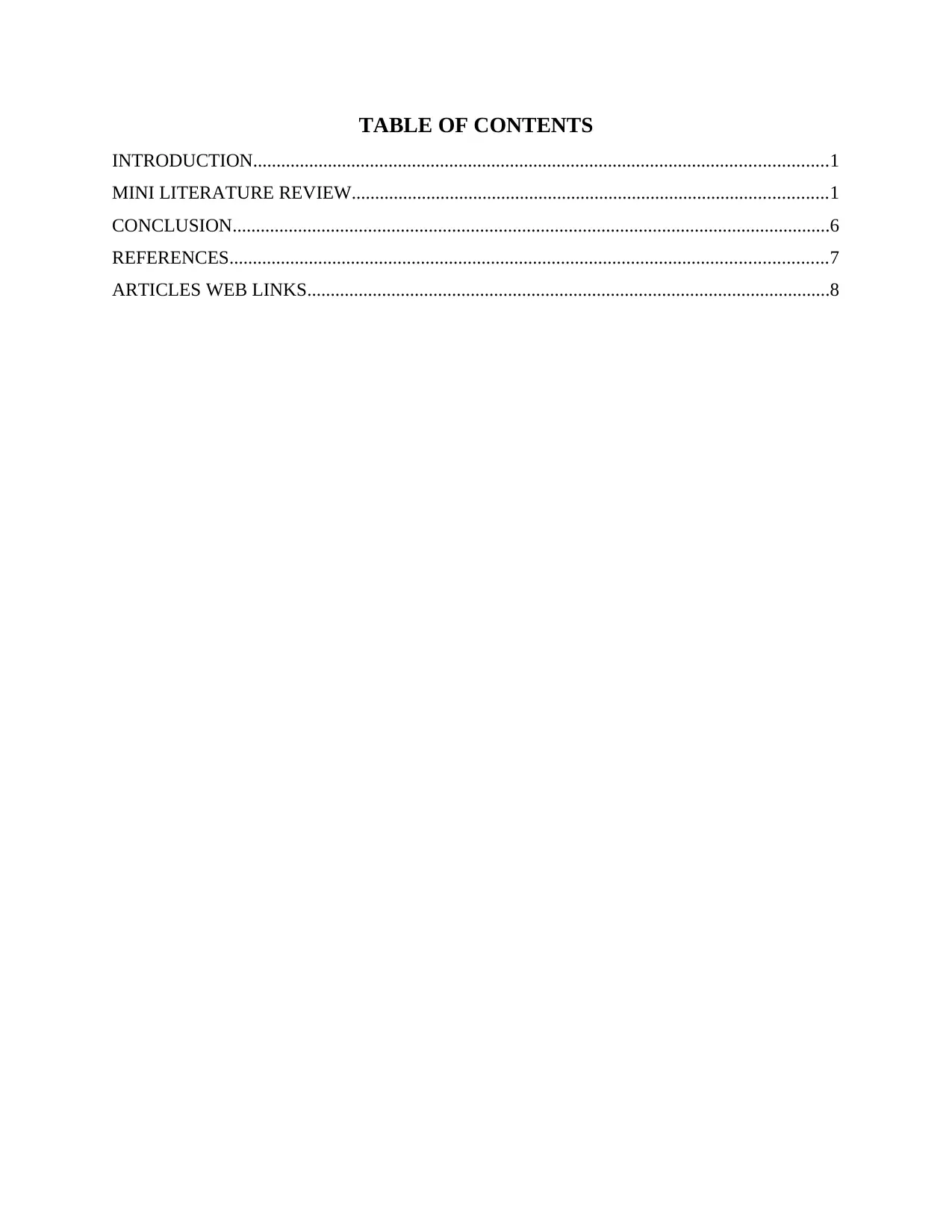
TABLE OF CONTENTS
INTRODUCTION...........................................................................................................................1
MINI LITERATURE REVIEW......................................................................................................1
CONCLUSION................................................................................................................................6
REFERENCES................................................................................................................................7
ARTICLES WEB LINKS................................................................................................................8
INTRODUCTION...........................................................................................................................1
MINI LITERATURE REVIEW......................................................................................................1
CONCLUSION................................................................................................................................6
REFERENCES................................................................................................................................7
ARTICLES WEB LINKS................................................................................................................8
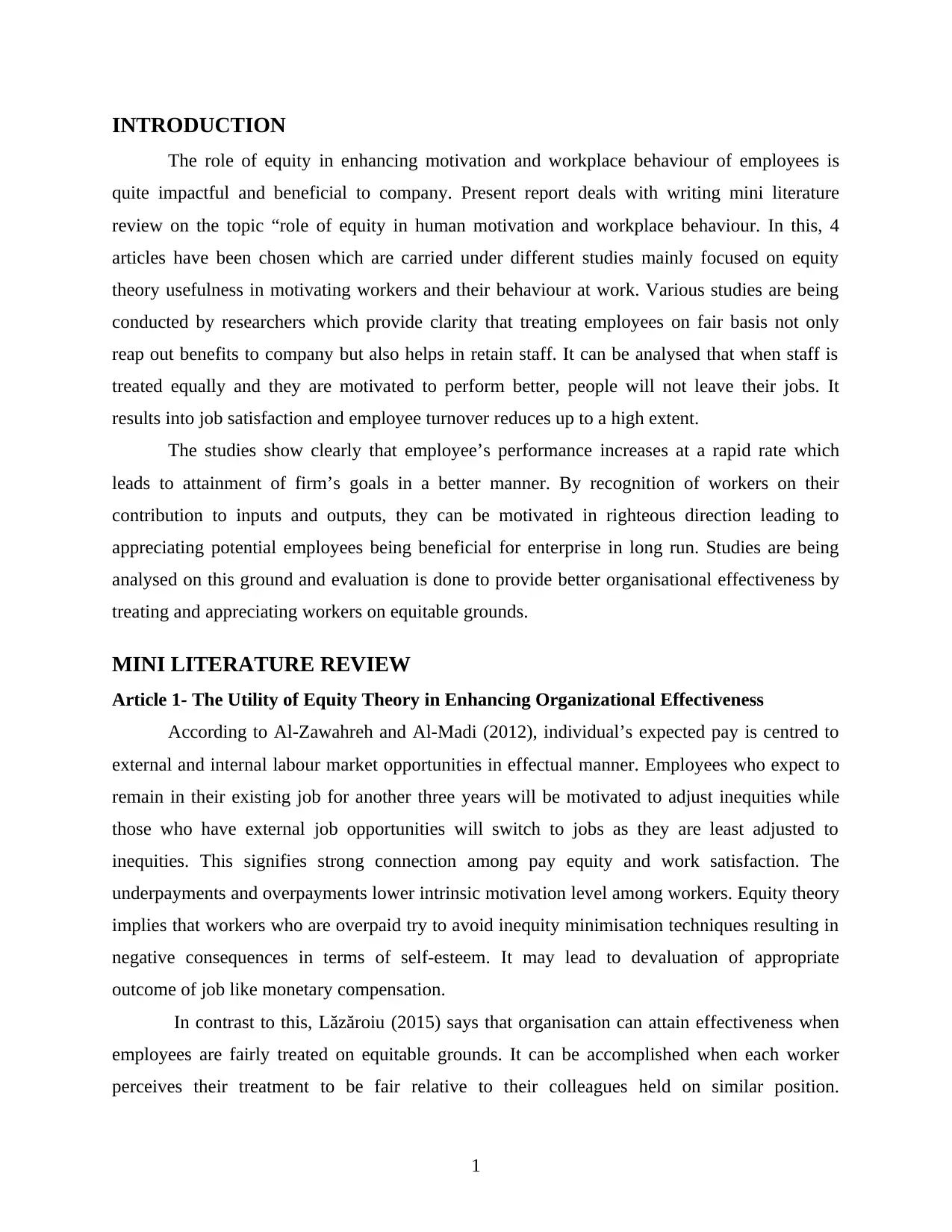
INTRODUCTION
The role of equity in enhancing motivation and workplace behaviour of employees is
quite impactful and beneficial to company. Present report deals with writing mini literature
review on the topic “role of equity in human motivation and workplace behaviour. In this, 4
articles have been chosen which are carried under different studies mainly focused on equity
theory usefulness in motivating workers and their behaviour at work. Various studies are being
conducted by researchers which provide clarity that treating employees on fair basis not only
reap out benefits to company but also helps in retain staff. It can be analysed that when staff is
treated equally and they are motivated to perform better, people will not leave their jobs. It
results into job satisfaction and employee turnover reduces up to a high extent.
The studies show clearly that employee’s performance increases at a rapid rate which
leads to attainment of firm’s goals in a better manner. By recognition of workers on their
contribution to inputs and outputs, they can be motivated in righteous direction leading to
appreciating potential employees being beneficial for enterprise in long run. Studies are being
analysed on this ground and evaluation is done to provide better organisational effectiveness by
treating and appreciating workers on equitable grounds.
MINI LITERATURE REVIEW
Article 1- The Utility of Equity Theory in Enhancing Organizational Effectiveness
According to Al-Zawahreh and Al-Madi (2012), individual’s expected pay is centred to
external and internal labour market opportunities in effectual manner. Employees who expect to
remain in their existing job for another three years will be motivated to adjust inequities while
those who have external job opportunities will switch to jobs as they are least adjusted to
inequities. This signifies strong connection among pay equity and work satisfaction. The
underpayments and overpayments lower intrinsic motivation level among workers. Equity theory
implies that workers who are overpaid try to avoid inequity minimisation techniques resulting in
negative consequences in terms of self-esteem. It may lead to devaluation of appropriate
outcome of job like monetary compensation.
In contrast to this, Lăzăroiu (2015) says that organisation can attain effectiveness when
employees are fairly treated on equitable grounds. It can be accomplished when each worker
perceives their treatment to be fair relative to their colleagues held on similar position.
1
The role of equity in enhancing motivation and workplace behaviour of employees is
quite impactful and beneficial to company. Present report deals with writing mini literature
review on the topic “role of equity in human motivation and workplace behaviour. In this, 4
articles have been chosen which are carried under different studies mainly focused on equity
theory usefulness in motivating workers and their behaviour at work. Various studies are being
conducted by researchers which provide clarity that treating employees on fair basis not only
reap out benefits to company but also helps in retain staff. It can be analysed that when staff is
treated equally and they are motivated to perform better, people will not leave their jobs. It
results into job satisfaction and employee turnover reduces up to a high extent.
The studies show clearly that employee’s performance increases at a rapid rate which
leads to attainment of firm’s goals in a better manner. By recognition of workers on their
contribution to inputs and outputs, they can be motivated in righteous direction leading to
appreciating potential employees being beneficial for enterprise in long run. Studies are being
analysed on this ground and evaluation is done to provide better organisational effectiveness by
treating and appreciating workers on equitable grounds.
MINI LITERATURE REVIEW
Article 1- The Utility of Equity Theory in Enhancing Organizational Effectiveness
According to Al-Zawahreh and Al-Madi (2012), individual’s expected pay is centred to
external and internal labour market opportunities in effectual manner. Employees who expect to
remain in their existing job for another three years will be motivated to adjust inequities while
those who have external job opportunities will switch to jobs as they are least adjusted to
inequities. This signifies strong connection among pay equity and work satisfaction. The
underpayments and overpayments lower intrinsic motivation level among workers. Equity theory
implies that workers who are overpaid try to avoid inequity minimisation techniques resulting in
negative consequences in terms of self-esteem. It may lead to devaluation of appropriate
outcome of job like monetary compensation.
In contrast to this, Lăzăroiu (2015) says that organisation can attain effectiveness when
employees are fairly treated on equitable grounds. It can be accomplished when each worker
perceives their treatment to be fair relative to their colleagues held on similar position.
1
⊘ This is a preview!⊘
Do you want full access?
Subscribe today to unlock all pages.

Trusted by 1+ million students worldwide
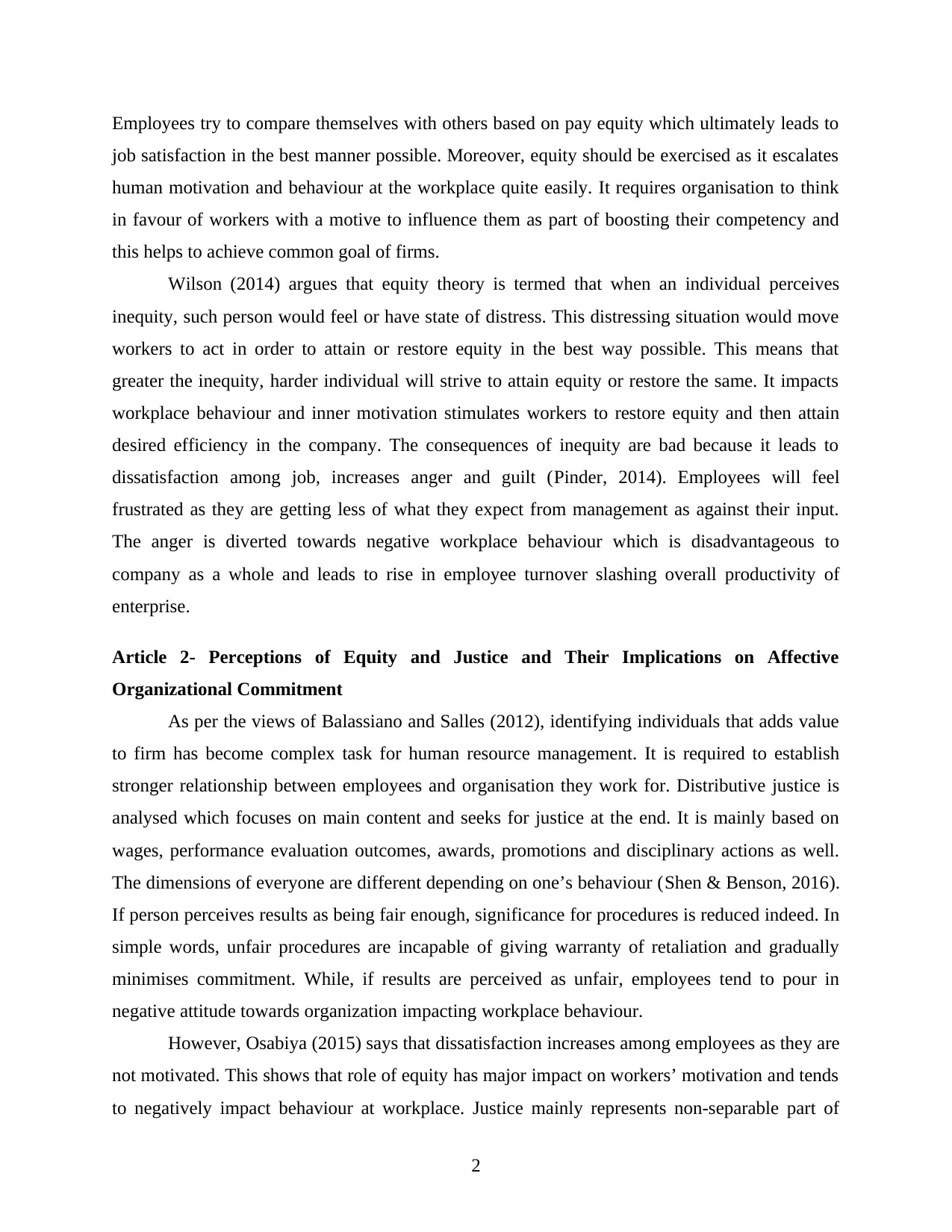
Employees try to compare themselves with others based on pay equity which ultimately leads to
job satisfaction in the best manner possible. Moreover, equity should be exercised as it escalates
human motivation and behaviour at the workplace quite easily. It requires organisation to think
in favour of workers with a motive to influence them as part of boosting their competency and
this helps to achieve common goal of firms.
Wilson (2014) argues that equity theory is termed that when an individual perceives
inequity, such person would feel or have state of distress. This distressing situation would move
workers to act in order to attain or restore equity in the best way possible. This means that
greater the inequity, harder individual will strive to attain equity or restore the same. It impacts
workplace behaviour and inner motivation stimulates workers to restore equity and then attain
desired efficiency in the company. The consequences of inequity are bad because it leads to
dissatisfaction among job, increases anger and guilt (Pinder, 2014). Employees will feel
frustrated as they are getting less of what they expect from management as against their input.
The anger is diverted towards negative workplace behaviour which is disadvantageous to
company as a whole and leads to rise in employee turnover slashing overall productivity of
enterprise.
Article 2- Perceptions of Equity and Justice and Their Implications on Affective
Organizational Commitment
As per the views of Balassiano and Salles (2012), identifying individuals that adds value
to firm has become complex task for human resource management. It is required to establish
stronger relationship between employees and organisation they work for. Distributive justice is
analysed which focuses on main content and seeks for justice at the end. It is mainly based on
wages, performance evaluation outcomes, awards, promotions and disciplinary actions as well.
The dimensions of everyone are different depending on one’s behaviour (Shen & Benson, 2016).
If person perceives results as being fair enough, significance for procedures is reduced indeed. In
simple words, unfair procedures are incapable of giving warranty of retaliation and gradually
minimises commitment. While, if results are perceived as unfair, employees tend to pour in
negative attitude towards organization impacting workplace behaviour.
However, Osabiya (2015) says that dissatisfaction increases among employees as they are
not motivated. This shows that role of equity has major impact on workers’ motivation and tends
to negatively impact behaviour at workplace. Justice mainly represents non-separable part of
2
job satisfaction in the best manner possible. Moreover, equity should be exercised as it escalates
human motivation and behaviour at the workplace quite easily. It requires organisation to think
in favour of workers with a motive to influence them as part of boosting their competency and
this helps to achieve common goal of firms.
Wilson (2014) argues that equity theory is termed that when an individual perceives
inequity, such person would feel or have state of distress. This distressing situation would move
workers to act in order to attain or restore equity in the best way possible. This means that
greater the inequity, harder individual will strive to attain equity or restore the same. It impacts
workplace behaviour and inner motivation stimulates workers to restore equity and then attain
desired efficiency in the company. The consequences of inequity are bad because it leads to
dissatisfaction among job, increases anger and guilt (Pinder, 2014). Employees will feel
frustrated as they are getting less of what they expect from management as against their input.
The anger is diverted towards negative workplace behaviour which is disadvantageous to
company as a whole and leads to rise in employee turnover slashing overall productivity of
enterprise.
Article 2- Perceptions of Equity and Justice and Their Implications on Affective
Organizational Commitment
As per the views of Balassiano and Salles (2012), identifying individuals that adds value
to firm has become complex task for human resource management. It is required to establish
stronger relationship between employees and organisation they work for. Distributive justice is
analysed which focuses on main content and seeks for justice at the end. It is mainly based on
wages, performance evaluation outcomes, awards, promotions and disciplinary actions as well.
The dimensions of everyone are different depending on one’s behaviour (Shen & Benson, 2016).
If person perceives results as being fair enough, significance for procedures is reduced indeed. In
simple words, unfair procedures are incapable of giving warranty of retaliation and gradually
minimises commitment. While, if results are perceived as unfair, employees tend to pour in
negative attitude towards organization impacting workplace behaviour.
However, Osabiya (2015) says that dissatisfaction increases among employees as they are
not motivated. This shows that role of equity has major impact on workers’ motivation and tends
to negatively impact behaviour at workplace. Justice mainly represents non-separable part of
2
Paraphrase This Document
Need a fresh take? Get an instant paraphrase of this document with our AI Paraphraser
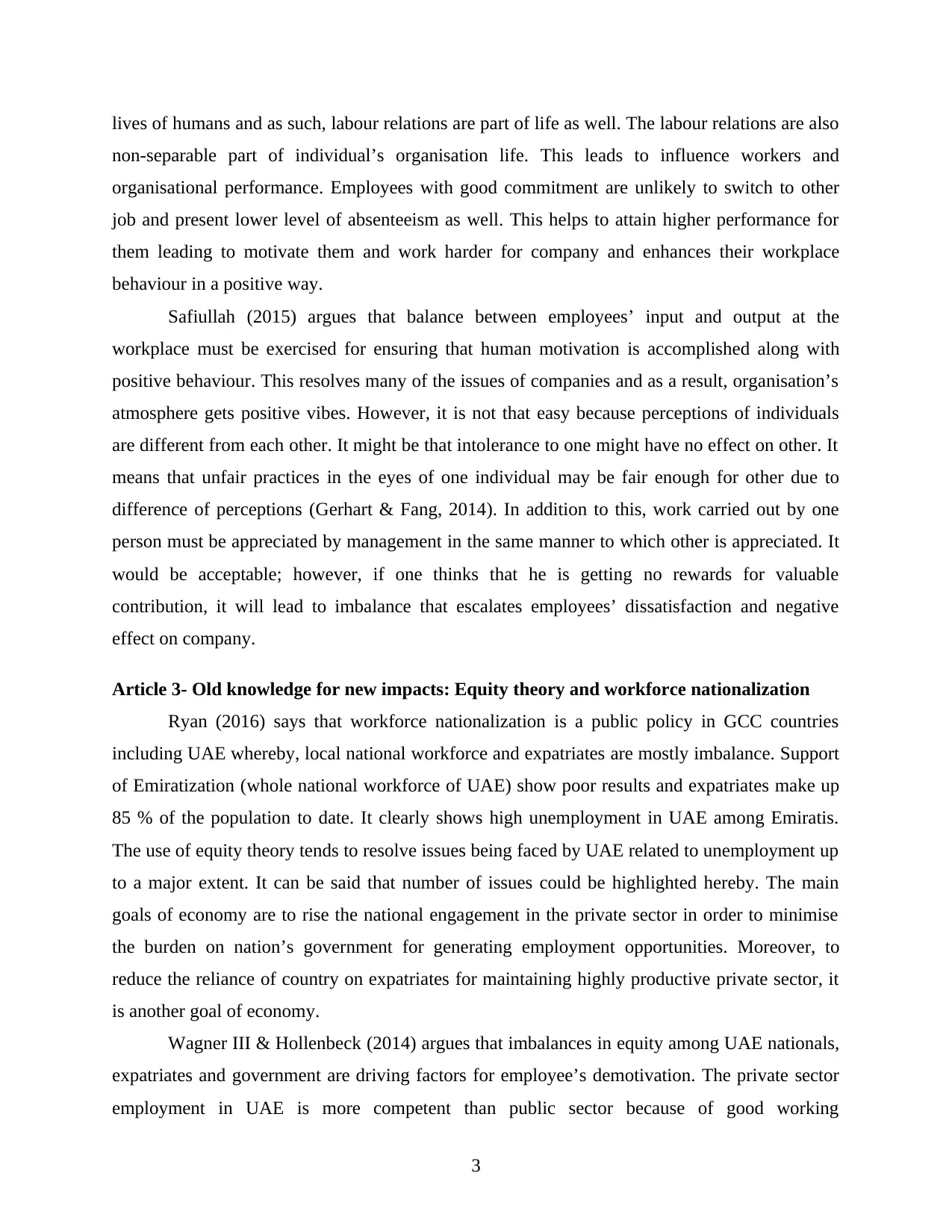
lives of humans and as such, labour relations are part of life as well. The labour relations are also
non-separable part of individual’s organisation life. This leads to influence workers and
organisational performance. Employees with good commitment are unlikely to switch to other
job and present lower level of absenteeism as well. This helps to attain higher performance for
them leading to motivate them and work harder for company and enhances their workplace
behaviour in a positive way.
Safiullah (2015) argues that balance between employees’ input and output at the
workplace must be exercised for ensuring that human motivation is accomplished along with
positive behaviour. This resolves many of the issues of companies and as a result, organisation’s
atmosphere gets positive vibes. However, it is not that easy because perceptions of individuals
are different from each other. It might be that intolerance to one might have no effect on other. It
means that unfair practices in the eyes of one individual may be fair enough for other due to
difference of perceptions (Gerhart & Fang, 2014). In addition to this, work carried out by one
person must be appreciated by management in the same manner to which other is appreciated. It
would be acceptable; however, if one thinks that he is getting no rewards for valuable
contribution, it will lead to imbalance that escalates employees’ dissatisfaction and negative
effect on company.
Article 3- Old knowledge for new impacts: Equity theory and workforce nationalization
Ryan (2016) says that workforce nationalization is a public policy in GCC countries
including UAE whereby, local national workforce and expatriates are mostly imbalance. Support
of Emiratization (whole national workforce of UAE) show poor results and expatriates make up
85 % of the population to date. It clearly shows high unemployment in UAE among Emiratis.
The use of equity theory tends to resolve issues being faced by UAE related to unemployment up
to a major extent. It can be said that number of issues could be highlighted hereby. The main
goals of economy are to rise the national engagement in the private sector in order to minimise
the burden on nation’s government for generating employment opportunities. Moreover, to
reduce the reliance of country on expatriates for maintaining highly productive private sector, it
is another goal of economy.
Wagner III & Hollenbeck (2014) argues that imbalances in equity among UAE nationals,
expatriates and government are driving factors for employee’s demotivation. The private sector
employment in UAE is more competent than public sector because of good working
3
non-separable part of individual’s organisation life. This leads to influence workers and
organisational performance. Employees with good commitment are unlikely to switch to other
job and present lower level of absenteeism as well. This helps to attain higher performance for
them leading to motivate them and work harder for company and enhances their workplace
behaviour in a positive way.
Safiullah (2015) argues that balance between employees’ input and output at the
workplace must be exercised for ensuring that human motivation is accomplished along with
positive behaviour. This resolves many of the issues of companies and as a result, organisation’s
atmosphere gets positive vibes. However, it is not that easy because perceptions of individuals
are different from each other. It might be that intolerance to one might have no effect on other. It
means that unfair practices in the eyes of one individual may be fair enough for other due to
difference of perceptions (Gerhart & Fang, 2014). In addition to this, work carried out by one
person must be appreciated by management in the same manner to which other is appreciated. It
would be acceptable; however, if one thinks that he is getting no rewards for valuable
contribution, it will lead to imbalance that escalates employees’ dissatisfaction and negative
effect on company.
Article 3- Old knowledge for new impacts: Equity theory and workforce nationalization
Ryan (2016) says that workforce nationalization is a public policy in GCC countries
including UAE whereby, local national workforce and expatriates are mostly imbalance. Support
of Emiratization (whole national workforce of UAE) show poor results and expatriates make up
85 % of the population to date. It clearly shows high unemployment in UAE among Emiratis.
The use of equity theory tends to resolve issues being faced by UAE related to unemployment up
to a major extent. It can be said that number of issues could be highlighted hereby. The main
goals of economy are to rise the national engagement in the private sector in order to minimise
the burden on nation’s government for generating employment opportunities. Moreover, to
reduce the reliance of country on expatriates for maintaining highly productive private sector, it
is another goal of economy.
Wagner III & Hollenbeck (2014) argues that imbalances in equity among UAE nationals,
expatriates and government are driving factors for employee’s demotivation. The private sector
employment in UAE is more competent than public sector because of good working
3
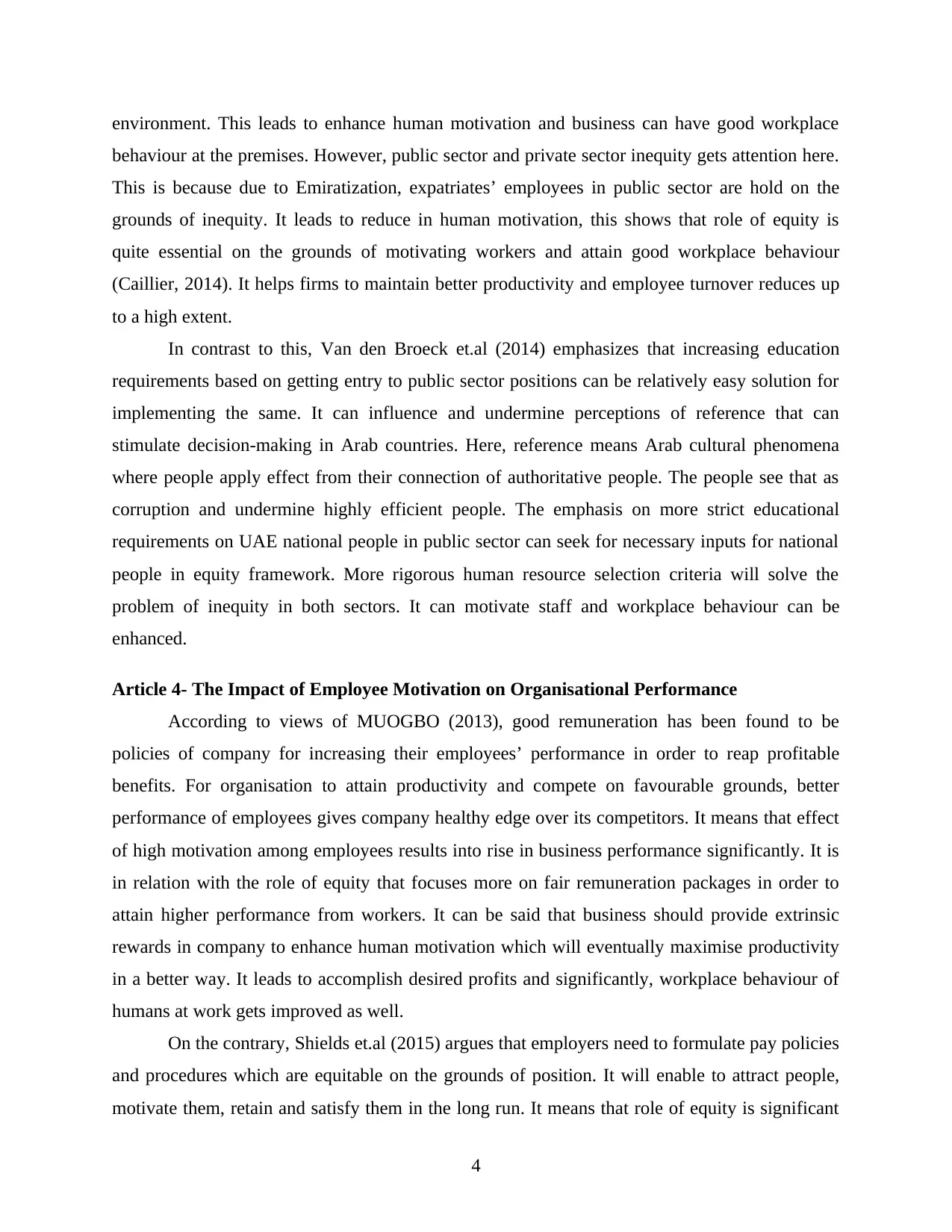
environment. This leads to enhance human motivation and business can have good workplace
behaviour at the premises. However, public sector and private sector inequity gets attention here.
This is because due to Emiratization, expatriates’ employees in public sector are hold on the
grounds of inequity. It leads to reduce in human motivation, this shows that role of equity is
quite essential on the grounds of motivating workers and attain good workplace behaviour
(Caillier, 2014). It helps firms to maintain better productivity and employee turnover reduces up
to a high extent.
In contrast to this, Van den Broeck et.al (2014) emphasizes that increasing education
requirements based on getting entry to public sector positions can be relatively easy solution for
implementing the same. It can influence and undermine perceptions of reference that can
stimulate decision-making in Arab countries. Here, reference means Arab cultural phenomena
where people apply effect from their connection of authoritative people. The people see that as
corruption and undermine highly efficient people. The emphasis on more strict educational
requirements on UAE national people in public sector can seek for necessary inputs for national
people in equity framework. More rigorous human resource selection criteria will solve the
problem of inequity in both sectors. It can motivate staff and workplace behaviour can be
enhanced.
Article 4- The Impact of Employee Motivation on Organisational Performance
According to views of MUOGBO (2013), good remuneration has been found to be
policies of company for increasing their employees’ performance in order to reap profitable
benefits. For organisation to attain productivity and compete on favourable grounds, better
performance of employees gives company healthy edge over its competitors. It means that effect
of high motivation among employees results into rise in business performance significantly. It is
in relation with the role of equity that focuses more on fair remuneration packages in order to
attain higher performance from workers. It can be said that business should provide extrinsic
rewards in company to enhance human motivation which will eventually maximise productivity
in a better way. It leads to accomplish desired profits and significantly, workplace behaviour of
humans at work gets improved as well.
On the contrary, Shields et.al (2015) argues that employers need to formulate pay policies
and procedures which are equitable on the grounds of position. It will enable to attract people,
motivate them, retain and satisfy them in the long run. It means that role of equity is significant
4
behaviour at the premises. However, public sector and private sector inequity gets attention here.
This is because due to Emiratization, expatriates’ employees in public sector are hold on the
grounds of inequity. It leads to reduce in human motivation, this shows that role of equity is
quite essential on the grounds of motivating workers and attain good workplace behaviour
(Caillier, 2014). It helps firms to maintain better productivity and employee turnover reduces up
to a high extent.
In contrast to this, Van den Broeck et.al (2014) emphasizes that increasing education
requirements based on getting entry to public sector positions can be relatively easy solution for
implementing the same. It can influence and undermine perceptions of reference that can
stimulate decision-making in Arab countries. Here, reference means Arab cultural phenomena
where people apply effect from their connection of authoritative people. The people see that as
corruption and undermine highly efficient people. The emphasis on more strict educational
requirements on UAE national people in public sector can seek for necessary inputs for national
people in equity framework. More rigorous human resource selection criteria will solve the
problem of inequity in both sectors. It can motivate staff and workplace behaviour can be
enhanced.
Article 4- The Impact of Employee Motivation on Organisational Performance
According to views of MUOGBO (2013), good remuneration has been found to be
policies of company for increasing their employees’ performance in order to reap profitable
benefits. For organisation to attain productivity and compete on favourable grounds, better
performance of employees gives company healthy edge over its competitors. It means that effect
of high motivation among employees results into rise in business performance significantly. It is
in relation with the role of equity that focuses more on fair remuneration packages in order to
attain higher performance from workers. It can be said that business should provide extrinsic
rewards in company to enhance human motivation which will eventually maximise productivity
in a better way. It leads to accomplish desired profits and significantly, workplace behaviour of
humans at work gets improved as well.
On the contrary, Shields et.al (2015) argues that employers need to formulate pay policies
and procedures which are equitable on the grounds of position. It will enable to attract people,
motivate them, retain and satisfy them in the long run. It means that role of equity is significant
4
⊘ This is a preview!⊘
Do you want full access?
Subscribe today to unlock all pages.

Trusted by 1+ million students worldwide
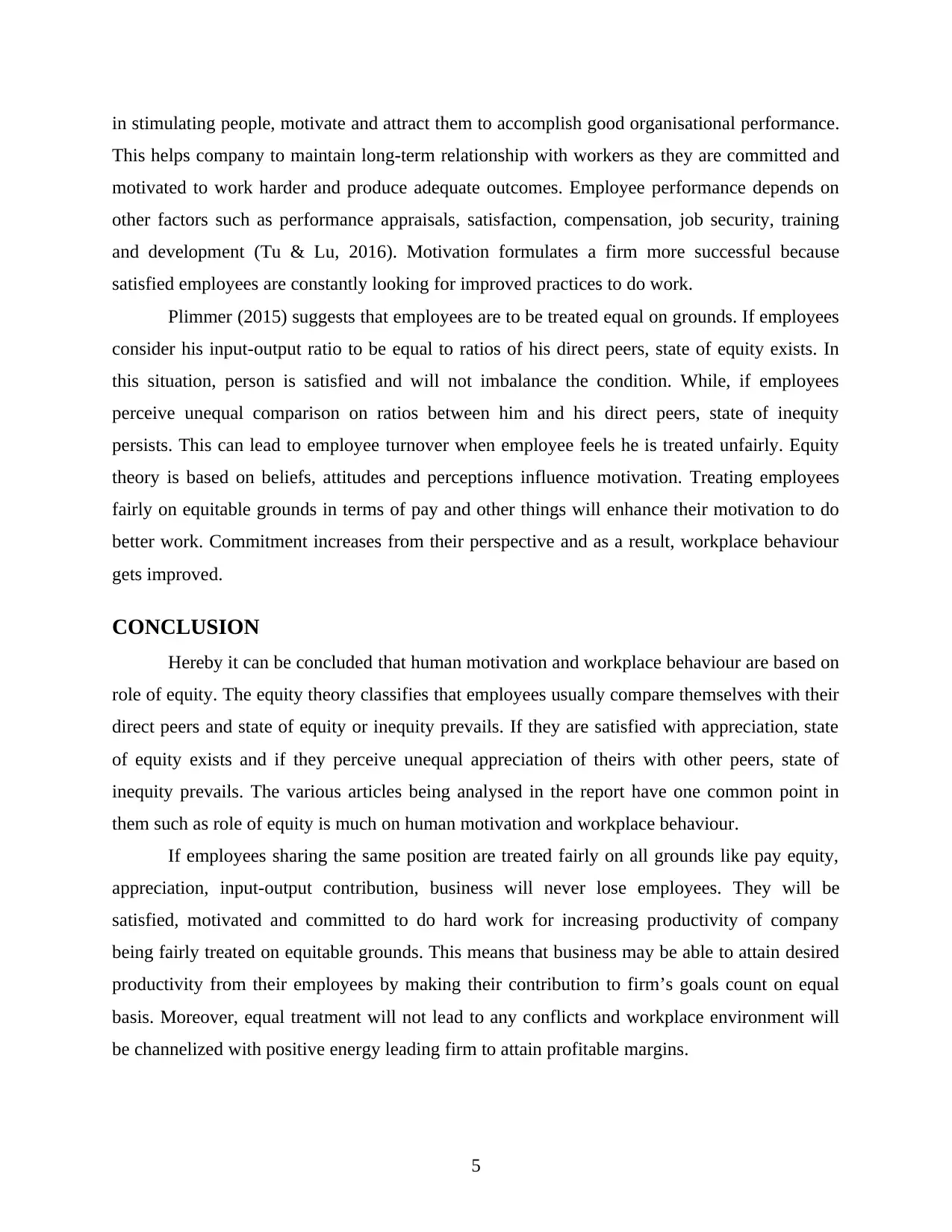
in stimulating people, motivate and attract them to accomplish good organisational performance.
This helps company to maintain long-term relationship with workers as they are committed and
motivated to work harder and produce adequate outcomes. Employee performance depends on
other factors such as performance appraisals, satisfaction, compensation, job security, training
and development (Tu & Lu, 2016). Motivation formulates a firm more successful because
satisfied employees are constantly looking for improved practices to do work.
Plimmer (2015) suggests that employees are to be treated equal on grounds. If employees
consider his input-output ratio to be equal to ratios of his direct peers, state of equity exists. In
this situation, person is satisfied and will not imbalance the condition. While, if employees
perceive unequal comparison on ratios between him and his direct peers, state of inequity
persists. This can lead to employee turnover when employee feels he is treated unfairly. Equity
theory is based on beliefs, attitudes and perceptions influence motivation. Treating employees
fairly on equitable grounds in terms of pay and other things will enhance their motivation to do
better work. Commitment increases from their perspective and as a result, workplace behaviour
gets improved.
CONCLUSION
Hereby it can be concluded that human motivation and workplace behaviour are based on
role of equity. The equity theory classifies that employees usually compare themselves with their
direct peers and state of equity or inequity prevails. If they are satisfied with appreciation, state
of equity exists and if they perceive unequal appreciation of theirs with other peers, state of
inequity prevails. The various articles being analysed in the report have one common point in
them such as role of equity is much on human motivation and workplace behaviour.
If employees sharing the same position are treated fairly on all grounds like pay equity,
appreciation, input-output contribution, business will never lose employees. They will be
satisfied, motivated and committed to do hard work for increasing productivity of company
being fairly treated on equitable grounds. This means that business may be able to attain desired
productivity from their employees by making their contribution to firm’s goals count on equal
basis. Moreover, equal treatment will not lead to any conflicts and workplace environment will
be channelized with positive energy leading firm to attain profitable margins.
5
This helps company to maintain long-term relationship with workers as they are committed and
motivated to work harder and produce adequate outcomes. Employee performance depends on
other factors such as performance appraisals, satisfaction, compensation, job security, training
and development (Tu & Lu, 2016). Motivation formulates a firm more successful because
satisfied employees are constantly looking for improved practices to do work.
Plimmer (2015) suggests that employees are to be treated equal on grounds. If employees
consider his input-output ratio to be equal to ratios of his direct peers, state of equity exists. In
this situation, person is satisfied and will not imbalance the condition. While, if employees
perceive unequal comparison on ratios between him and his direct peers, state of inequity
persists. This can lead to employee turnover when employee feels he is treated unfairly. Equity
theory is based on beliefs, attitudes and perceptions influence motivation. Treating employees
fairly on equitable grounds in terms of pay and other things will enhance their motivation to do
better work. Commitment increases from their perspective and as a result, workplace behaviour
gets improved.
CONCLUSION
Hereby it can be concluded that human motivation and workplace behaviour are based on
role of equity. The equity theory classifies that employees usually compare themselves with their
direct peers and state of equity or inequity prevails. If they are satisfied with appreciation, state
of equity exists and if they perceive unequal appreciation of theirs with other peers, state of
inequity prevails. The various articles being analysed in the report have one common point in
them such as role of equity is much on human motivation and workplace behaviour.
If employees sharing the same position are treated fairly on all grounds like pay equity,
appreciation, input-output contribution, business will never lose employees. They will be
satisfied, motivated and committed to do hard work for increasing productivity of company
being fairly treated on equitable grounds. This means that business may be able to attain desired
productivity from their employees by making their contribution to firm’s goals count on equal
basis. Moreover, equal treatment will not lead to any conflicts and workplace environment will
be channelized with positive energy leading firm to attain profitable margins.
5
Paraphrase This Document
Need a fresh take? Get an instant paraphrase of this document with our AI Paraphraser
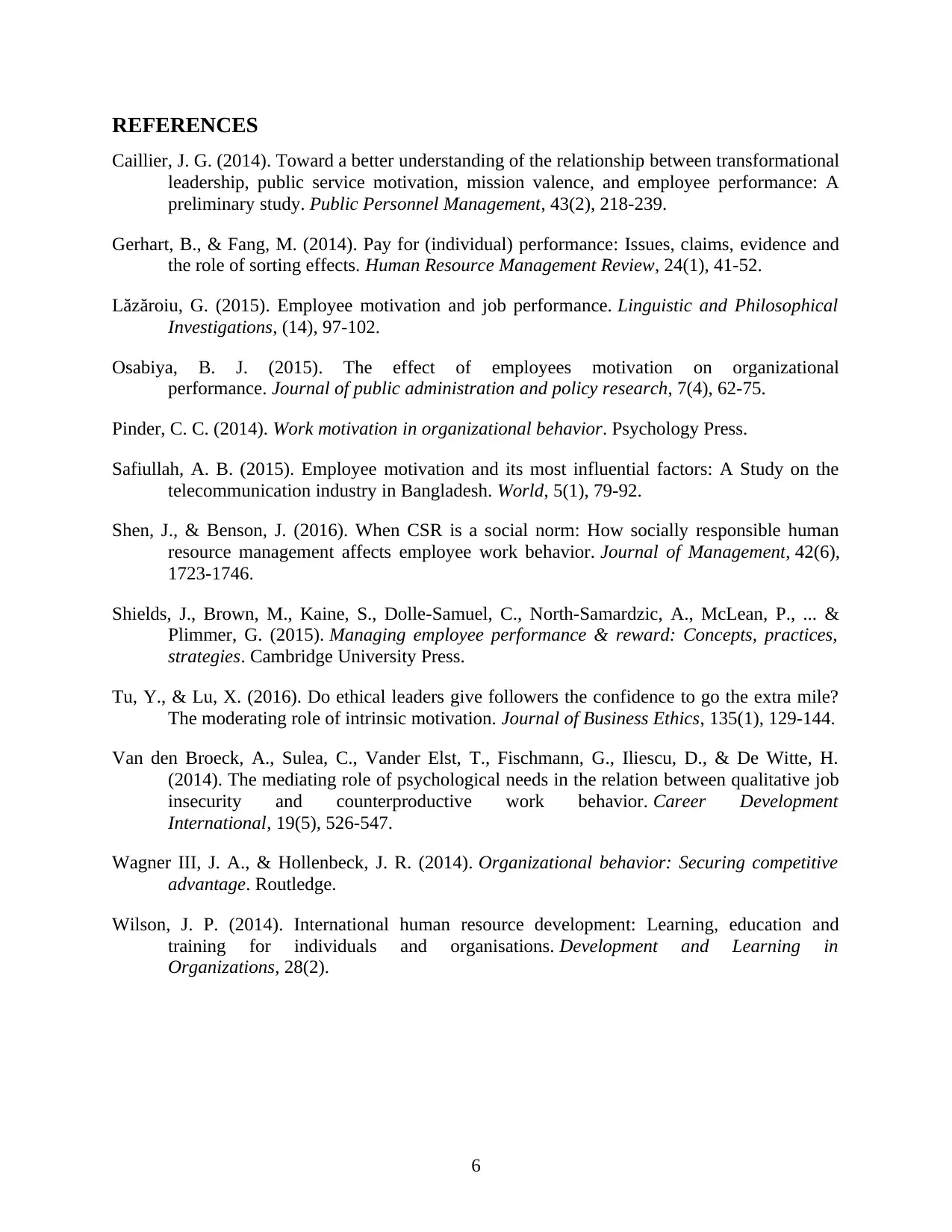
REFERENCES
Caillier, J. G. (2014). Toward a better understanding of the relationship between transformational
leadership, public service motivation, mission valence, and employee performance: A
preliminary study. Public Personnel Management, 43(2), 218-239.
Gerhart, B., & Fang, M. (2014). Pay for (individual) performance: Issues, claims, evidence and
the role of sorting effects. Human Resource Management Review, 24(1), 41-52.
Lăzăroiu, G. (2015). Employee motivation and job performance. Linguistic and Philosophical
Investigations, (14), 97-102.
Osabiya, B. J. (2015). The effect of employees motivation on organizational
performance. Journal of public administration and policy research, 7(4), 62-75.
Pinder, C. C. (2014). Work motivation in organizational behavior. Psychology Press.
Safiullah, A. B. (2015). Employee motivation and its most influential factors: A Study on the
telecommunication industry in Bangladesh. World, 5(1), 79-92.
Shen, J., & Benson, J. (2016). When CSR is a social norm: How socially responsible human
resource management affects employee work behavior. Journal of Management, 42(6),
1723-1746.
Shields, J., Brown, M., Kaine, S., Dolle-Samuel, C., North-Samardzic, A., McLean, P., ... &
Plimmer, G. (2015). Managing employee performance & reward: Concepts, practices,
strategies. Cambridge University Press.
Tu, Y., & Lu, X. (2016). Do ethical leaders give followers the confidence to go the extra mile?
The moderating role of intrinsic motivation. Journal of Business Ethics, 135(1), 129-144.
Van den Broeck, A., Sulea, C., Vander Elst, T., Fischmann, G., Iliescu, D., & De Witte, H.
(2014). The mediating role of psychological needs in the relation between qualitative job
insecurity and counterproductive work behavior. Career Development
International, 19(5), 526-547.
Wagner III, J. A., & Hollenbeck, J. R. (2014). Organizational behavior: Securing competitive
advantage. Routledge.
Wilson, J. P. (2014). International human resource development: Learning, education and
training for individuals and organisations. Development and Learning in
Organizations, 28(2).
6
Caillier, J. G. (2014). Toward a better understanding of the relationship between transformational
leadership, public service motivation, mission valence, and employee performance: A
preliminary study. Public Personnel Management, 43(2), 218-239.
Gerhart, B., & Fang, M. (2014). Pay for (individual) performance: Issues, claims, evidence and
the role of sorting effects. Human Resource Management Review, 24(1), 41-52.
Lăzăroiu, G. (2015). Employee motivation and job performance. Linguistic and Philosophical
Investigations, (14), 97-102.
Osabiya, B. J. (2015). The effect of employees motivation on organizational
performance. Journal of public administration and policy research, 7(4), 62-75.
Pinder, C. C. (2014). Work motivation in organizational behavior. Psychology Press.
Safiullah, A. B. (2015). Employee motivation and its most influential factors: A Study on the
telecommunication industry in Bangladesh. World, 5(1), 79-92.
Shen, J., & Benson, J. (2016). When CSR is a social norm: How socially responsible human
resource management affects employee work behavior. Journal of Management, 42(6),
1723-1746.
Shields, J., Brown, M., Kaine, S., Dolle-Samuel, C., North-Samardzic, A., McLean, P., ... &
Plimmer, G. (2015). Managing employee performance & reward: Concepts, practices,
strategies. Cambridge University Press.
Tu, Y., & Lu, X. (2016). Do ethical leaders give followers the confidence to go the extra mile?
The moderating role of intrinsic motivation. Journal of Business Ethics, 135(1), 129-144.
Van den Broeck, A., Sulea, C., Vander Elst, T., Fischmann, G., Iliescu, D., & De Witte, H.
(2014). The mediating role of psychological needs in the relation between qualitative job
insecurity and counterproductive work behavior. Career Development
International, 19(5), 526-547.
Wagner III, J. A., & Hollenbeck, J. R. (2014). Organizational behavior: Securing competitive
advantage. Routledge.
Wilson, J. P. (2014). International human resource development: Learning, education and
training for individuals and organisations. Development and Learning in
Organizations, 28(2).
6
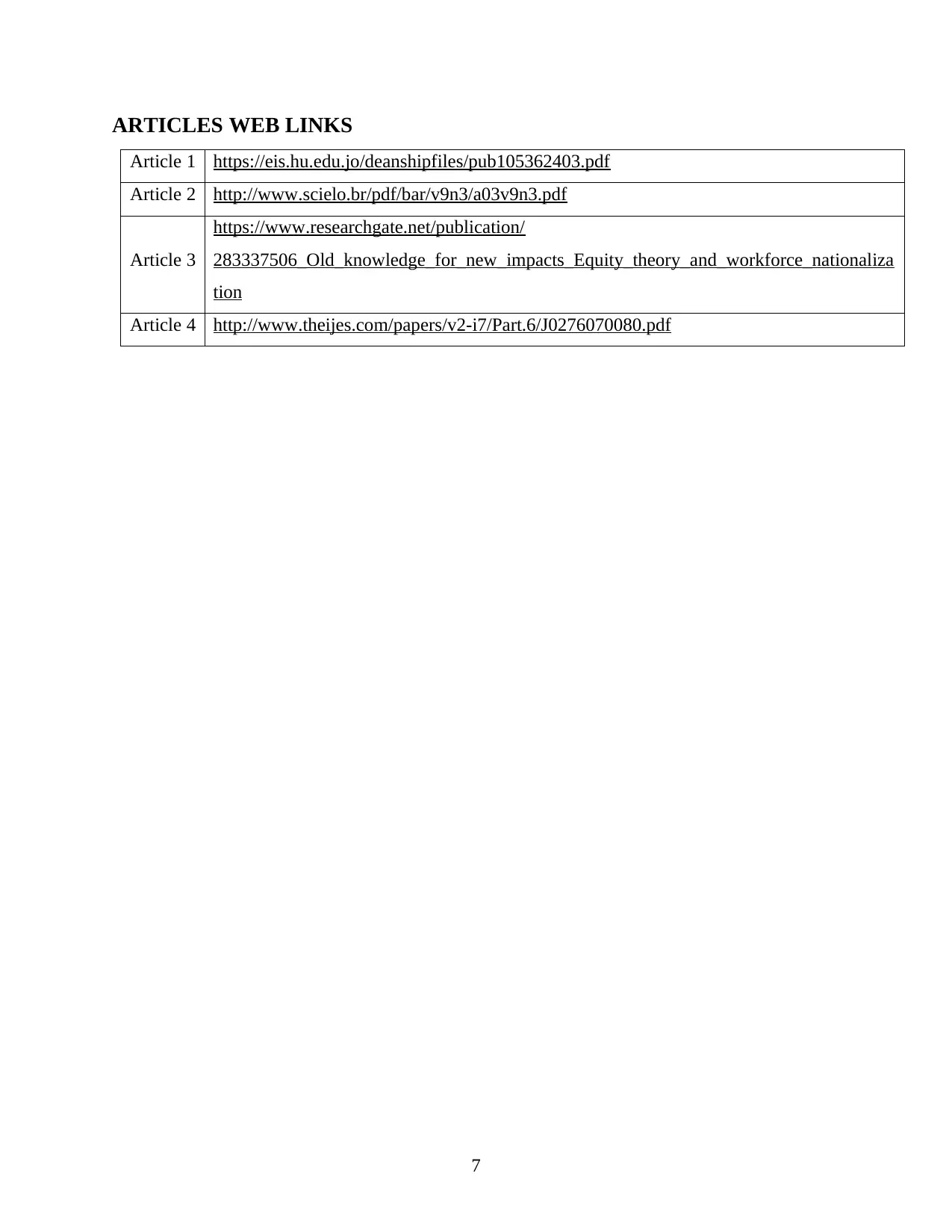
ARTICLES WEB LINKS
Article 1 https://eis.hu.edu.jo/deanshipfiles/pub105362403.pdf
Article 2 http://www.scielo.br/pdf/bar/v9n3/a03v9n3.pdf
Article 3
https://www.researchgate.net/publication/
283337506_Old_knowledge_for_new_impacts_Equity_theory_and_workforce_nationaliza
tion
Article 4 http://www.theijes.com/papers/v2-i7/Part.6/J0276070080.pdf
7
Article 1 https://eis.hu.edu.jo/deanshipfiles/pub105362403.pdf
Article 2 http://www.scielo.br/pdf/bar/v9n3/a03v9n3.pdf
Article 3
https://www.researchgate.net/publication/
283337506_Old_knowledge_for_new_impacts_Equity_theory_and_workforce_nationaliza
tion
Article 4 http://www.theijes.com/papers/v2-i7/Part.6/J0276070080.pdf
7
⊘ This is a preview!⊘
Do you want full access?
Subscribe today to unlock all pages.

Trusted by 1+ million students worldwide
1 out of 9
Related Documents
Your All-in-One AI-Powered Toolkit for Academic Success.
+13062052269
info@desklib.com
Available 24*7 on WhatsApp / Email
![[object Object]](/_next/static/media/star-bottom.7253800d.svg)
Unlock your academic potential
Copyright © 2020–2026 A2Z Services. All Rights Reserved. Developed and managed by ZUCOL.





